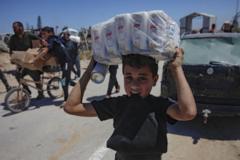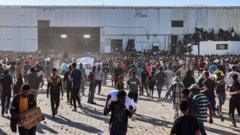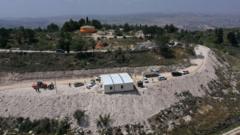The United Nations has condemned Israel's newly launched aid initiative in Gaza after a disorganized distribution led to panic among many Palestinians.
U.N. Slams Israel's New Aid Plan as Tensions Escalate in Gaza

U.N. Slams Israel's New Aid Plan as Tensions Escalate in Gaza
A chaotic aid distribution event raises serious concerns about Israel's new approach to humanitarian efforts in Gaza.
The new operation, supported by Israeli leadership, aims to bypass both the United Nations and Hamas, yet it has drawn criticism for being insufficient regardless of its execution. As thousands of desperate attendees scrambled for supplies in Rafah, the situation escalated when Israeli forces fired warning shots to control the crowd.
This development highlights serious concerns regarding Israel's strategy to reshape humanitarian aid delivery in Gaza, which Israeli officials justify as a method to weaken Hamas's influence. The initiative faced immediate backlash from the international community, including fellow western countries, amidst Israel's increasing threats of renewed military action against Hamas following a two-month blockade on humanitarian supplies, which recently concluded.
Despite the ongoing criticism and operational chaos, the newly established Gaza Humanitarian Foundation claims it successfully initiated aid distribution through two hubs and has reportedly delivered thousands of aid packages. However, Kaja Kallas, a leading diplomat for the European Union, emphasized the need for humanitarian actions to be devoid of political and military manipulation, condemning civilian casualties as intolerable.
This Israeli-designed system, in a marked shift from previous UN-led efforts, includes four aid distribution sites in southern Gaza, monitored by Israeli soldiers and private U.S. contractors. Israeli officials have expressed dissatisfaction with the UN's past performance, citing a perceived bias against Israel and alleging failures to prevent Hamas from appropriating vital supplies. The chaos at the new distribution center and the ongoing unrest in the region underscore the challenges and complexities of providing effective humanitarian assistance amidst a backdrop of political turmoil.
This development highlights serious concerns regarding Israel's strategy to reshape humanitarian aid delivery in Gaza, which Israeli officials justify as a method to weaken Hamas's influence. The initiative faced immediate backlash from the international community, including fellow western countries, amidst Israel's increasing threats of renewed military action against Hamas following a two-month blockade on humanitarian supplies, which recently concluded.
Despite the ongoing criticism and operational chaos, the newly established Gaza Humanitarian Foundation claims it successfully initiated aid distribution through two hubs and has reportedly delivered thousands of aid packages. However, Kaja Kallas, a leading diplomat for the European Union, emphasized the need for humanitarian actions to be devoid of political and military manipulation, condemning civilian casualties as intolerable.
This Israeli-designed system, in a marked shift from previous UN-led efforts, includes four aid distribution sites in southern Gaza, monitored by Israeli soldiers and private U.S. contractors. Israeli officials have expressed dissatisfaction with the UN's past performance, citing a perceived bias against Israel and alleging failures to prevent Hamas from appropriating vital supplies. The chaos at the new distribution center and the ongoing unrest in the region underscore the challenges and complexities of providing effective humanitarian assistance amidst a backdrop of political turmoil.





















